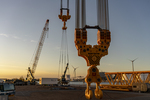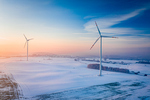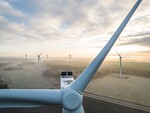12/20/2007
Kenya - Wind energy driving rural growth
Simon Mwacharo knows one or two things about moving under the feet of the big boys and girls to be the first on the cash till. While KenGen is scheming in the boardroom on how to meet the rising demand for electricity, Mwacharo is on the ground, providing hundreds of homes with electricity generated from the wind.
Margaret Kasisi Gichanga, a resident of the Kiserian area, does not have to agonise about electricity blackouts, nor how the water from the borehole will be pumped into her four bedroomed house.
Adjacent to her house is a wind propelled electricity generator, hoisted about five metres above ground with metal bars and supported with steel wires.
A copper wire drops from the propeller into the control room to charge two batteries - which are housed together by a device that converts battery power (direct current) into electricity (alternating power). The converter is then connected to the main house and the water pump, to complete the wind electricity cycle.
"It is amazing. Maintenance costs are extremely low. We put it up one and half years ago and it has never required repair," said Jessy Maragi, a resident of Kiserian.
Electricity generated from wind power is now a reality in Kenya, even as KenGen, the national main electricity generator, grapples with boardroom matters on how such energy could be tapped at a commercial level.
According to KenGen's managing director Eddy Njoroge, the company is redeveloping its wind energy generator at Ngong Hills, which will produce about six mega watts. However, the company has not given a timeline for its completion.
KenGen is also involved in a joint venture to develop for 30 megawatts in Kinangop, and is considering developing a 200 megawatt generator in Marsabit.
However, he said that more data is needed to determine the real capacity of wind power in Kenya.
"The ministry of energy has developed a wind power atlas but we need to go a little further and analyse what type of wind we have, and the characteristics, to decide the next steps. This is the stage where we are," said Mr Njoroge.
But tucked inside the sprawling urban settlement of Kibera is Mr Mwacharo, a trained Kiswahili and History teacher, who in 2000 decided to try his hand in a technical venture.
Self-trained, he developed simple wind- powered electricity generators which he has expanded into entities that can now light a village town, as he has done in the Bura area of Tana River District.
"I have not done any technical courses but I read a lot about wind power from the libraries and the Internet," says Mr Mwacharo who employs 10 people in his workshop. In one year, he can sell five to 15 wind electricity plants -mainly to community based organisations, teachers and schools.
He says his marketing is based on word-of-mouth. Mwacharo has already patented his technology and works closely with the Kenya Industrial Research and Development Institute to develop his equipment using the most recent technology.
He has also patented his concept through the Kenya Industrial Property Institute (KIPI). A plant with the capacity to light a four-bedroom house, plus power a television set, a radio and a fridge would cost about Sh40,000.
{mosimage Mr Jessy Maragi, displays fruits grown using water pumped by wind-powered equipment.
The high end equipment sells for up to Sh1.5 million, with capacity to provide about 12 kilowatts of energy that can power a mini-factory or light a village town.
Mwacharo says that 90 per cent of the materials he uses to assemble his plants are locally available, and the equipment is assembled in a way that it can work even in areas where there is no powerful wind.
While Mwacharo would like to expand his venture, capital is a major challenge. "I am keen to partner with investors who are ready to pump in money. The market is so huge we are unable to meet the orders because our capacity in capital and human resource is less," he says.
Unlike conventional wind turbines, which use gears and hence require strong winds to be propelled, his plants operate on bearings. This means that they can be propelled by less wind and can withstand windstorms. Using wind power energy as an alternative source of electricity has recently started to gain currency in Kenya because of the rising demand, a growing economy and a slower pace for KenGen to meet electricity demand.
In June, for instance, a private company known as Wind Flow entered into a Sh49 billion venture with British firm African Clean Energy to invest in wind-power. The two firms announced then that they will first set-up a wind farm in Marsabit to provide an alternate power source for the country.
The second phase of the project will see the development of a power transmission line from Marsabit to Isiolo. The electricity will be sold to KenGen, so that it can integrate it into the national grind. Wind is the fastest growing source of electricity in the world, though it remains a minor player compared to more common fossil fuels and other alternatives such as: geothermal, hydro and nuclear power.
Wind power uses natural air movements to drive giant windmill blades, which turn turbines that convert the kinetic energy into electrical power. Wind turbine sales are projected to rise from Sh1.7 trillion to almost double that amount by 2011, according to research firm BTM Consult.
Margaret Kasisi Gichanga, a resident of the Kiserian area, does not have to agonise about electricity blackouts, nor how the water from the borehole will be pumped into her four bedroomed house.
Adjacent to her house is a wind propelled electricity generator, hoisted about five metres above ground with metal bars and supported with steel wires.
A copper wire drops from the propeller into the control room to charge two batteries - which are housed together by a device that converts battery power (direct current) into electricity (alternating power). The converter is then connected to the main house and the water pump, to complete the wind electricity cycle.
"It is amazing. Maintenance costs are extremely low. We put it up one and half years ago and it has never required repair," said Jessy Maragi, a resident of Kiserian.
Electricity generated from wind power is now a reality in Kenya, even as KenGen, the national main electricity generator, grapples with boardroom matters on how such energy could be tapped at a commercial level.
According to KenGen's managing director Eddy Njoroge, the company is redeveloping its wind energy generator at Ngong Hills, which will produce about six mega watts. However, the company has not given a timeline for its completion.
KenGen is also involved in a joint venture to develop for 30 megawatts in Kinangop, and is considering developing a 200 megawatt generator in Marsabit.
However, he said that more data is needed to determine the real capacity of wind power in Kenya.
"The ministry of energy has developed a wind power atlas but we need to go a little further and analyse what type of wind we have, and the characteristics, to decide the next steps. This is the stage where we are," said Mr Njoroge.
But tucked inside the sprawling urban settlement of Kibera is Mr Mwacharo, a trained Kiswahili and History teacher, who in 2000 decided to try his hand in a technical venture.
Self-trained, he developed simple wind- powered electricity generators which he has expanded into entities that can now light a village town, as he has done in the Bura area of Tana River District.
"I have not done any technical courses but I read a lot about wind power from the libraries and the Internet," says Mr Mwacharo who employs 10 people in his workshop. In one year, he can sell five to 15 wind electricity plants -mainly to community based organisations, teachers and schools.
He says his marketing is based on word-of-mouth. Mwacharo has already patented his technology and works closely with the Kenya Industrial Research and Development Institute to develop his equipment using the most recent technology.
He has also patented his concept through the Kenya Industrial Property Institute (KIPI). A plant with the capacity to light a four-bedroom house, plus power a television set, a radio and a fridge would cost about Sh40,000.
{mosimage Mr Jessy Maragi, displays fruits grown using water pumped by wind-powered equipment.
The high end equipment sells for up to Sh1.5 million, with capacity to provide about 12 kilowatts of energy that can power a mini-factory or light a village town.
Mwacharo says that 90 per cent of the materials he uses to assemble his plants are locally available, and the equipment is assembled in a way that it can work even in areas where there is no powerful wind.
While Mwacharo would like to expand his venture, capital is a major challenge. "I am keen to partner with investors who are ready to pump in money. The market is so huge we are unable to meet the orders because our capacity in capital and human resource is less," he says.
Unlike conventional wind turbines, which use gears and hence require strong winds to be propelled, his plants operate on bearings. This means that they can be propelled by less wind and can withstand windstorms. Using wind power energy as an alternative source of electricity has recently started to gain currency in Kenya because of the rising demand, a growing economy and a slower pace for KenGen to meet electricity demand.
In June, for instance, a private company known as Wind Flow entered into a Sh49 billion venture with British firm African Clean Energy to invest in wind-power. The two firms announced then that they will first set-up a wind farm in Marsabit to provide an alternate power source for the country.
The second phase of the project will see the development of a power transmission line from Marsabit to Isiolo. The electricity will be sold to KenGen, so that it can integrate it into the national grind. Wind is the fastest growing source of electricity in the world, though it remains a minor player compared to more common fossil fuels and other alternatives such as: geothermal, hydro and nuclear power.
Wind power uses natural air movements to drive giant windmill blades, which turn turbines that convert the kinetic energy into electrical power. Wind turbine sales are projected to rise from Sh1.7 trillion to almost double that amount by 2011, according to research firm BTM Consult.
- Source:
- Online editorial www.windfair.net
- Author:
- Edited by Trevor Sievert, Online Editorial Journalist
- Email:
- press@windfair.net
- Link:
- www.windfair.net/...
- Keywords:
- wind energy, wind farm, renewable energy, wind power, wind turbine, rotorblade, offshore, onshore


























